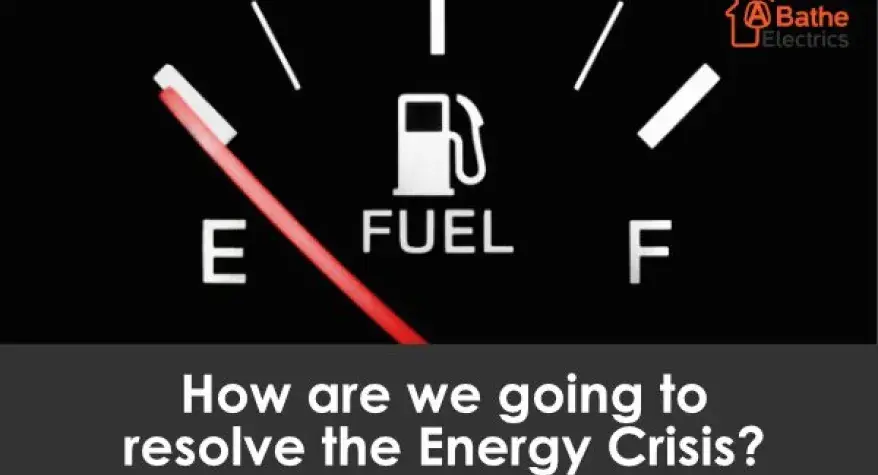How are we going to tackle the Energy Crisis?
I used to be very proactive about finding the best energy supplier every year. We were always very determined to not pay more than we needed to; to ensure that we kept our utility payments to a minimum. So, annually we would look for the best deal.
Well, it did not work out too well for us this year! Our energy company wasn’t one that went bust but now as our fixed energy tariff comes to an end in April much larger bills are expected.
What is contributing to the Energy Crisis?
I am hopeful though that the energy crisis will not exist forever. Cop26 highlighted the need for every country to switch to more sustainable energy supplies in order to restore our already damaged environment. Certainly, I am in favour of switching to more sustainable sources of power from an ethical perspective.
But I also think that we need to be less reliant on other countries for our energy. As I write, the German nation has halted the certification of a new gas pipeline from Russia as a sanction against their warmongering against Ukraine. It has highlighted how globally interconnected our energy supplies are; we are so reliant on other countries for power. This can mean we are tempted to sacrifice our ethical principles for the sake of maintaining energy supplies. It also means we can be bullied or blackmailed by other nations. It limits our freedom to be self-determining.
Also, the energy supply crisis is exacerbated by an energy demand crisis. Over the next century, our electrical energy demands are only set to increase. The UK government has a target that all new cars will be electrical by 2030. This is a massive target to hit. They know that it will be better for the environment, but it will also make our nation less dependent on oil and gas supplies.
Politics affecting supply, the environment under threat, the cost of energy, and an increase in demand, to name but a few problems, can make it feel like the future of our energy supplies is very uncertain. My own brush with the impact of the energy crisis this month prompted me to have a little look into the future of the energy industry in the UK. Where is our power going to come from over the next decade or so?
An increase in wind farms
I was pleasantly surprised to learn that the UK is one of the leading nations in the offshore wind market. We make enough electricity from wind farms to power 18.5 million homes. That is a quarter of the energy we require every year. This form of electricity generation is only going to grow, as five major offshore wind farms are being built or under development off the coast of East Anglia and near Hornsea. Our long coastline means there are lots of places where we can build wind farms without impinging on our countryside.
New sources of energy
A lot of us are familiar with the different types of renewable energy sources – wind, solar, hydroelectric, etc. But recently, scientists have also made considerable progress in creating new sources of energy generation. Nuclear fusion (different from nuclear power) technology has undergone a huge breakthrough. Scientists can now create power by smashing hydrogen atoms together. It is the same process that takes place within stars to generate energy and the potential for this technology to provide energy in the future is massive. It is still many years off a workable power plant yet, but there is certainly hope that our children’s generation will benefit from this new power source.
Solar will be the cheapest renewable
A report from the International Energy Agency reveals that solar power is now, by far, the cheapest renewable source of energy. The UK certainly is not a hot spot for solar power generation. Our climate is just not suited. We may not feel the impact of this cheap energy. But it is certainly good news for Developing Countries, which tend to be situated closer to the equator.
Batteries are the future
One massive area that has really piqued my interest is the topic of batteries. Massive amounts of money and effort are being spent on the development of energy storage and infrastructure. Scientists are aware that the world desperately needs to shift away from oil and gas. Renewable energy sources generate electricity and the government has made it clear that they want to ban all diesel and unleaded cars by 2030. This means that we are going to need a whole load of batteries! Not only that but batteries that can be recycled or reused in a sustainable way. We do not want to be creating another set of problems where we create really cheap batteries and cheap electricity, only to generate large quantities of landfill because we cannot recycle them.
But more sophisticated batteries will allow us to chose when we recharge our batteries – this means that we could save money by recharging when energy is cheap. It is this technology that excites me the most, as the average user will potentially feel the benefit of more disposable income. It could be that we build an infrastructure that allows us to have a battery-operated house as well as a battery-operated car!
The biggest challenge facing this exciting new technology is the supply of the raw materials that make up the batteries and the manufacturing infrastructure to create them. One expert says we need the creation of 6 or 7 “gigafactories” in the UK to meet the potential demand. To give you some idea of the scale, the current battery Gigafactory run by Tesla in Nevada is 1.9 million square feet!
Green, cheaper, more flexible energy
If the technology and infrastructure are developed to maximise the benefit of battery-powered living, we could potentially find that our electricity in the future is greener and cheaper. It also seems that we may have more control over when we charge, use, and discharge the power that we have. Potentially, these developments will have a massive positive impact on our lives. But the money that will be needed to be put into changing the infrastructure of our nation to make the best use of these developments is staggering.
Overall, though, I am feeling positive. Large leaps have been made and the government’s determination to develop green, sustainable energy is clear. Maybe I will get a cheaper electricity bill in a few years’ time?!




